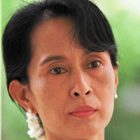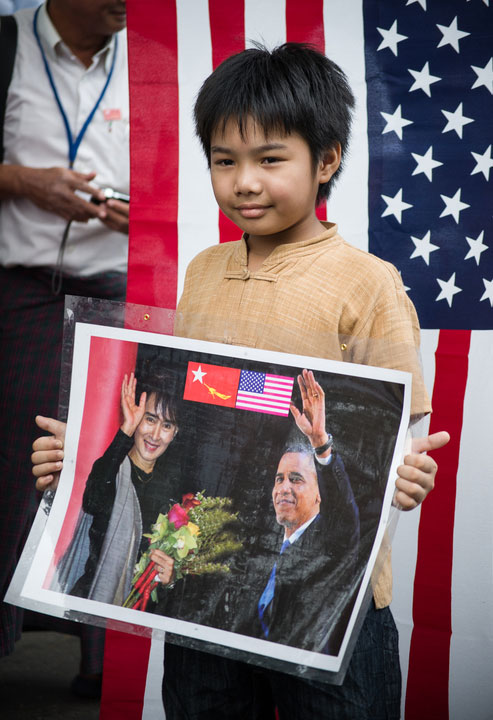Index relies entirely on the support of donors and readers to do its work.
Help us keep amplifying censored voices today.
Monday (1 April) heralded the return of private daily newspapers to Burma. Since the 1962 Printers and Publishers Registration Act the state has held highly restrictive powers to license newspapers and publishers creating one of the most hostile environments on earth for a free print media. Since the transition period of the past few years began, President Thein Sein has signalled that the government would liberalise restrictions on the media. Prior to the return of daily newspapers, privately-owned weekly journals had begun to flourish as demand for independent news markedly increased. On 1 February this year, the government launched the process to allow the independent media to bid for daily licenses.
Index on Censorship spoke to journalists and proprietors in Burma during a recent mission to the country in March. The return of independent daily newspapers has not been without incident. The government refused to grant licenses for daily publication to a number of publications including the Eleven Media Group, apparently because their application lacked an official revenue stamp valued at 100 kyats ($0.12). This decision was overturned in March and the group will launch its daily newspaper “The Daily Eleven” symbolically on World Press Freedom Day on May 3 according to AP.
Previously news was published in weekly journals that reviewed news and politics and had to submit all their proofs to the Press Scrutiny and Registration Division (PSRD) prior to publication (hence weekly publication). According to state journal the New Light of Myanmar, the termination of the PSRD was signed off at the cabinet meeting of 24 January 2013. Though ominously, the report claimed a new “Copyrights and Registration Division” would be formed under the Information and Public Relations Department.
Index on Censorship views the licensing of newspapers as an unwarranted restriction on freedom of the media. The registration process for daily newspapers in Burma has been particularly restrictive with the application requiring a code of practice, a code of ethics and a code of conduct for the publication — even though the Press Council is working on a series of ethical codes for journalists as part of its on-going negotiations to draft a more proportionate press law.
One editor told Index he had applied for a press license on 21 February and had not yet heard of the result by 13 March. The application was over 80 pages in total and the local authorities stated the application needed to be in both Burmese and English. Journalists told Index several questions on the application for a daily newspaper license concerned the previous political activities of the applicant, which raised concerns that political considerations will be taken into account when awarding the limited number of licenses proposed.
Further advances in media freedom are expected in the coming months, with foreign journalists to be given working visas from mid-April (rather than taking the risk of a tourist visa as is the norm now) and the BBC hoping to broadcast its global news channel in Burma later this year. Reporters Without Borders has moved Burma’s ranking in its Press Freedom Index up 18 places to 151 out of 179 countries.
Yet, old habits die hard. On the first day of new daily newspapers, the government kept the independent media at arm’s length from an official state visit by the President of Singapore Tony Tan Keng Yam with only the official state media allowed into the press conference surrounding the trip. A forthcoming Index report into the state of freedom of expression in Burma will examine these trends in further detail.
 The fight for freedom begins with freedom of speech, says Burma’s pro-democracy leader Aung San Suu Kyi. This is one of a series of manifestos demanding a more outspoken world in the 40th anniversary issue of Index on Censorship
The fight for freedom begins with freedom of speech, says Burma’s pro-democracy leader Aung San Suu Kyi. This is one of a series of manifestos demanding a more outspoken world in the 40th anniversary issue of Index on Censorship
A US military judge has ruled the government must dismantle a monitoring system which allowed censors to suspend the broadcast of hearings for Guantanamo prisoners suspected of planning the 9/11 attacks. Army Colonel James Pohl said on 31 January it was “the last time” a third party could decide whether the hearings would be broadcast. The closed-circuit broadcast feed was stopped for a few minutes during a 28 January pre-trial hearing of Khalid Sheikh Mohammed — alleged organiser of the 9/11 attacks — and four other defendants. It revealed for the first time that an unknown external force was listening in on the trial and censoring proceedings at will. The feed was cut when Mohammed’s lawyer David Nevin requested the preserve secret CIA prisons where the defendants had been held before being taken to Guantanamo. Pohl, who was unsure why the information was censored as it was public information, said he and the court security officer were the only ones allowed to halt the broadcast.
An investigation into protests in Burma in November 2012 has discovered that police forces used white phosphorus to disperse crowds, causing demonstrators severe burns. Police involvement left more than 100 Buddhist monks and other participants badly burned, injuries authorities said were caused by tear gas and smoke grenades. An analysis in a Bangkok laboratory concluded that the canisters, which were collected by lawyers after the protests, contained traces of white phosphorus.
Protestors had staged an occupation at Letpaduang copper mine for 11 days before police broke up the crowd. The report will be sent to a government appointed panel fronted by opposition leader Aung San Suu Kyi for review. White Phosphorus is typically used in war to create a smoke screen and its use against people has been disputed.
An Indian state has banned a film for 15 days following complaints that it was offensive to Muslims. Tamil Nadu state in southern India banned the action film Vishwaroopam — which was due to be released on 25 January — after concerns that protests outside cinemas could turn violent. Muslim groups said the film portrayed their faith in a negative light and were offended that the terrorist in the film was Muslim. Tamil Nadu’s Chief Minister Jayalalithaa Jayaram said the state didn’t have enough police to impose law and order outside the 500 cinemas it was set to play in. Film director and co-producer Kamal Haasan has appealed for the ban to be lifted in Tamil Nadu and is expected to hear a judgement by 6 February.

Naomi Campbell has won damages after the Telegraph falsely claimed she organised elephant polo matches
On 31 January, a 15-year-old girl in Iceland won the right to keep her birth name, despite authorities saying it wasn’t feminine enough. Reykjavik District Court allowed Blaer Bjarkardottir to hold on to her first name Blaer, meaning light breeze — a name her mother Bjork Eidsdottir gave her from birth, apparently unaware the name was on the government banned list. Icelandic authorities had originally rejected the name for being too masculine, referring to her only as “girl” in communication with officials. Iceland has official rules for what name a baby can be given. Names are supposed to fit with Icelandic grammatical rules and the alphabet. The ruling means the name can now be taken by girls across Iceland.
Naomi Campbell has accepted damages from The Daily Telegraph after she was falsely accused of organising an elephant polo match in India for her partner’s birthday. The newspaper had printed a story on 3 November 2012, alleging that Campbell arranged the tournament in Jodhpur for Vladimir Doronin’s 50th birthday celebrations. The model accepted an apology from the Telegraph, as well as “substantial” damages — although the figure has not been disclosed. Campbell’s lawyer Gideon Benaim said at London’s High Court that the “unfounded” claims had caused a “storm” of publicity in India after media outlets across the country republished the story.
President Barack Obama’s speech at Yangoon University appears to be another step in what he described as a “remarkable journey” for the country. The progress does look real.
Back in 2007, BBC special correspondent Fergal Keane wrote a report for Index after he returned from reporting the brutal crackdown on the Saffron revolution.
He alluded to the necessarily secretive nature of entering the country and meeting interviewees:
I won’t go into how I managed to get into the country: suffice to say that I was able to operate for several days without being picked up. It was nerve wracking and posed immense human and journalistic challenges.
While describing the immense difficulties local activists faced, he was optimistic about the role of the web in opening up the country and helping local democrats get their story out. “[T]he “bamboo curtain” has been lowered once again,” wrote Keane. “But not for long I believe.”

Yangon, Burma: A child holds a picture of Aung San Suu Kyi along with President Obama (Demotix)
Five years on, and Burma seemed to have changed almost beyond recognition for Keane:
“Since the beginning of 2012 I’ve visited Burma three times. Each trip has been on an official journalist visa. Not once have I been harassed, intimidated or interfered with. I have reported from city slums and rural villages, from huge opposition rallies and from within sedate government compounds. On my first ‘official’ trip I walked the streets of downtown Rangoon interviewing people at random. Again my expectation was that a secret policeman would appear from the shadows and bundle myself and the camera team away. But nothing happened.”
Shortly before Keane wrote that dispatch, the Burmese government had announced that it was scaling down censorship. On 1 June Tint Swe, head of the Press Scrutinisation and Registration Department was quoted by AFP saying:”There will be no press scrutiny job from the end of June. There will be no monitoring of local journals and magazines.”
Remarkable in a country where newspapers and magazines had faced pre-publication censorship for decades.
After the release of political prisoners in 2011, including opposition leader Aung San Suu Kyi and and satirist Zarganar, the first real test of whether the broader population would enjoy extended free speech under the newly liberalised regime came in January of this year, with the Arts of Freedom Film Festival, which more or less passed the test (barring the rejection of some submissions from outside Burma.
Since then, progress has been pretty much consistent. But there is a long way to go yet. Burma is nowhere near a democracy, and the disturbing reports of violence against the Rohinga Muslim population (and the opposition NLD’s apparent indifference to it) are certainly cause for alarm.
Obama spoke today Burma’s need to embrace Roosevelt’s four fundamental freedoms: freedom of speech, freedom of worship, freedom from want, and freedom from fear. Burma has huge challenges in all these areas.
Padraig Reidy is news editor at Index